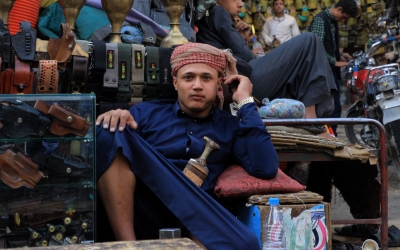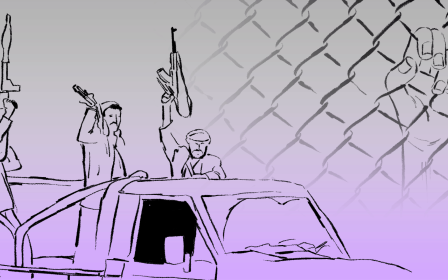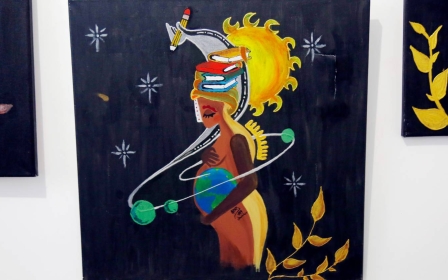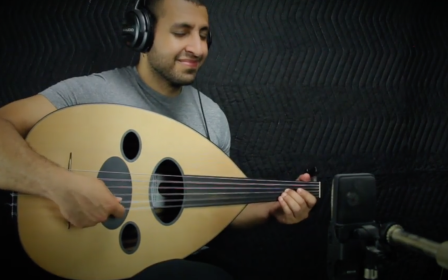Houthis set sights on international recognition as Yemen peace talks progress
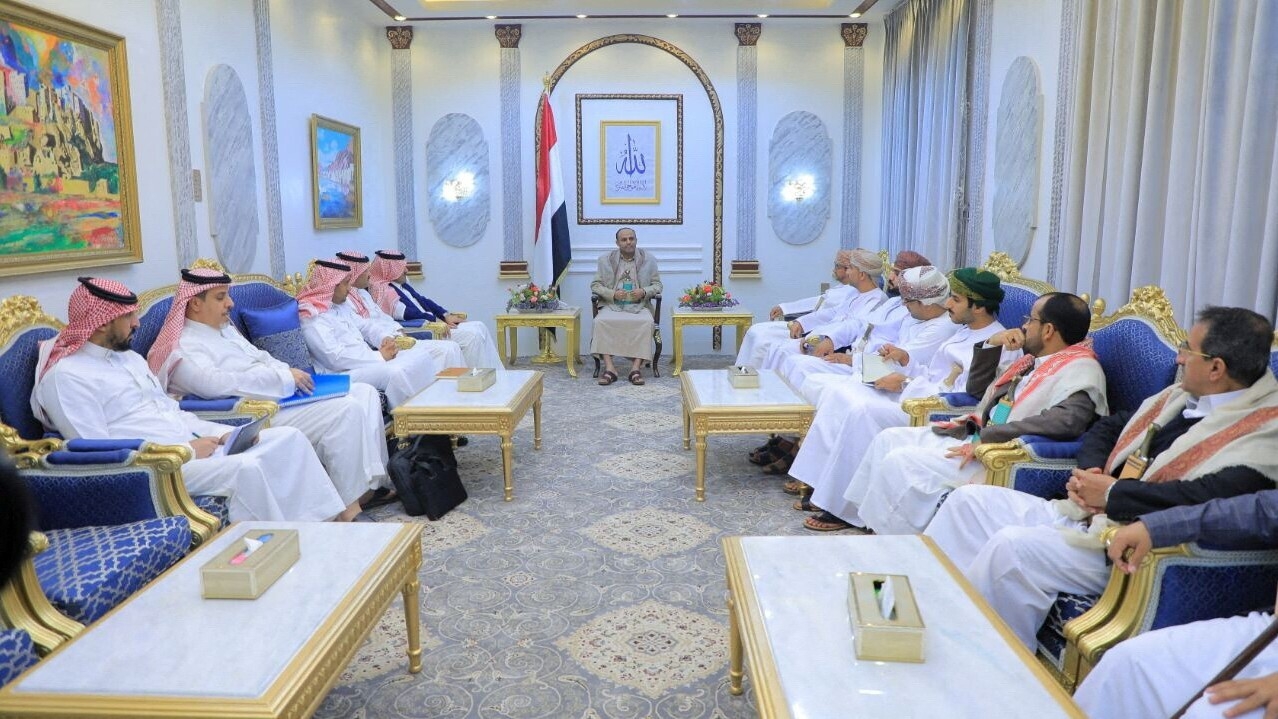
In the Yemeni capital, significant diplomatic activity is afoot: Saudi and Houthi officials are meeting publicly for the first time since the civil war broke out in 2014.
On Sunday, Saudi Arabia’s ambassador to Yemen, Mohammed Al-Jaber, was pictured shaking hands with Houthi political chief Mahdi al-Mashat in Sanaa, ahead of peace talks that also included an Omani delegation.
"The fanfare and attention around the joint Saudi-Omani delegation’s visit to Sanaa underlines... that Yemen’s conflict has reached a crucial inflection point," said Adam Baron, an adviser at the Centre for Humanitarian Dialogue.
"There is a visceral feeling of something jarring in seeing these photos after all that's happened," Baron added, despite the fact that such meetings "have been occurring in private".
One of those present on Sunday, Houthi leader Ali Qarshah, only six years ago had a $5m price tag placed on his head by the Saudis, as part of a list of 40 figures suspected of "terrorist activity".
New MEE newsletter: Jerusalem Dispatch
Sign up to get the latest insights and analysis on Israel-Palestine, alongside Turkey Unpacked and other MEE newsletters
But after eight years of hostility and devastation, in what has widely been described as the world’s worst humanitarian crisis, momentum is building for a permanent ceasefire.
For the Houthis - the rebel group that seized the capital in 2014 and forced the internationally recognised government to flee to Saudi Arabia - an agreement could set the path to permanent recognition and further territorial gains.
'Saudi surrender'
Houthi fighter Yunis, 22, who fought on the front line in the key strategic city of Marib, is overjoyed at the prospect of a Saudi deal.
"I am happy, and I feel I am living the best days in my life. This development has made thousands of fighters believe they are on the right direction," he told Middle East Eye.
But he struck a warning: "We will continue fighting if this peace effort leads nowhere."
In March 2015, a Saudi-led coalition, which included the United Arab Emirates, intervened on behalf of the Yemeni government to push back the Iran-aligned Houthis after they took control of Sanaa.
Coalition air strikes killed thousands of civilians, according to UN reports, while the Houthis launched missiles and drones at civilian infrastructure in Saudi Arabia and the UAE.
A six-month truce brokered by the UN that ended in October is still mostly holding, giving long-awaited respite to Yemenis.
'We will continue fighting if this peace effort leads nowhere'
- Yunis, Houthi fighter
The Saudi visit to Yemen comes just weeks after a broader reconciliation between Riyadh and Iran, brokered by China.
On Saturday, Saudi officials arrived in Iran to discuss procedures for reopening Riyadh's embassy in Tehran and consulate in Mashhad as a result of the deal.
Yunis believes that Riyadh’s delegation arriving in Sanaa is proof of "Saudi surrender".
"Saudi Arabia and its allies had refused to talk with us directly. They described us as militias and terrorists," he said. "They bombed us mercilessly, thinking they would defeat us."
The talks this week will centre around a timeline for foreign fighters to leave Yemen, the payment of wages for public sector workers, and lifting restrictions on the country’s airports and ports in Houthi-controlled areas.
On Thursday, nearly 900 detainees will be flown between Yemen and Saudi Arabia as part of the largest prisoner exchange between the two countries since October 2020.
Talks 'nothing to do with Yemen'
Nadwa al-Dawsari, a researcher at the Middle East Institute, said that Riyadh and the Houthis, who hold much of Yemen's north, are only looking after their own interests during the discussions.
"These talks have nothing to do with Yemen. These talks are between the Saudis and the Houthis," she told MEE. "They've got nothing to do with the other actors inside Yemen."
Dawsari said Saudi Arabia aims to "wash their hands of Yemen" after years of criticism for waging war on its neighbour.
"The Houthis' objective is still to seize control over all of Yemen," she said. "Once that deal is signed, well, the Houthis will just march into Marib and will march into the rest of Yemen."
She added that the Houthis have long aimed to establish military power and control over enough of the country to "force the international community" to recognise them politically.
"Now the moment has come," Dawsari said.
Saudi Arabia played a role in re-organising the Aden-based Presidential Leadership Council (PLC), a disparate collection of anti-Houthi forces in the country that serve as the executive body of the internationally recognised government.
The PLC, whose eight members include figures from the separatist Southern Transitional Council and a nephew of former autocrat Ali Abdullah Saleh, have largely been kept in the dark during this week’s discussions.
"The PLC designated the Houthis as a terrorist group and now [they] are forced to sign a deal with the Houthis," said Dawsari. "That can tell you the level to which these groups are involved or not involved in these talks."
The Aden-based government has welcomed the de-escalation talks, despite appearing to be sidelined by its ally, Riyadh.
The fighter Yunis said the Houthis will continue to have the upper hand in Yemen’s north, and would not allow foreign influence.
'Iran has won this war… They have empowered their ally in Yemen and they did it without direct intervention'
- Nadwa al-Dawsari, researcher
"Saudi Arabia played a role in appointing Yemeni officials in the Aden-based government in southern Yemen. Such a scenario will not happen in northern Yemen," he said.
There is foreign influence over the Houthis, though, in the form of their ally, Iran.
"Iran has won this war. Iran has done a brilliant job with the Houthis. They have empowered their ally in Yemen and they did it... without direct intervention," said Dawsari.
She also believes that Saudi Arabia is hoping for one of two options in the future: "Either the Houthis will abandon Iran and be friends with the Saudis... or Iran will somehow de-escalate.
"This is just wishful thinking on the Saudi side," she said.
Aaya al-Shamahi contributed to this report
Middle East Eye delivers independent and unrivalled coverage and analysis of the Middle East, North Africa and beyond. To learn more about republishing this content and the associated fees, please fill out this form. More about MEE can be found here.


